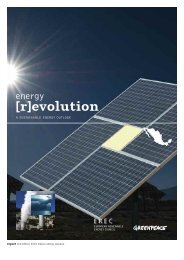download the turkey energy revolution scenario
download the turkey energy revolution scenario
download the turkey energy revolution scenario
You also want an ePaper? Increase the reach of your titles
YUMPU automatically turns print PDFs into web optimized ePapers that Google loves.
GLOBAL ENERGY [R]EVOLUTION<br />
A SUSTAINABLE TURKEY ENERGY OUTLOOK<br />
3<br />
<strong>the</strong> <strong>energy</strong> [r]evolution<br />
3<br />
“half <strong>the</strong> solution to climate change<br />
is <strong>the</strong> smart use of power.”<br />
GREENPEACE INTERNATIONAL<br />
CLIMATE CAMPAIGN<br />
© G. POROPAT/D REAMSTIME<br />
The climate change imperative demands nothing short of an <strong>energy</strong><br />
<strong>revolution</strong>. The expert consensus is that this fundamental change<br />
must begin very soon and be well underway within <strong>the</strong> next ten<br />
years in order to avert <strong>the</strong> worst impacts. What we need is a<br />
complete transformation in <strong>the</strong> way we produce, consume and<br />
distribute <strong>energy</strong> and at <strong>the</strong> same time maintain economic growth.<br />
Nothing short of such a <strong>revolution</strong> will enable us to limit global<br />
warming to far less than a rise in temperature of 2°C, above which<br />
<strong>the</strong> impacts become devastating.<br />
Current electricity generation relies mainly on burning fossil fuels,<br />
with <strong>the</strong>ir associated CO2 emissions, in very large power stations<br />
which waste much of <strong>the</strong>ir primary input <strong>energy</strong>. More <strong>energy</strong> is<br />
lost as <strong>the</strong> power is moved around <strong>the</strong> electricity grid network and<br />
converted from high transmission voltage down to a supply suitable<br />
for domestic or commercial consumers. The system is innately<br />
vulnerable to disruption: localised technical, wea<strong>the</strong>r-related or even<br />
deliberately caused faults can quickly cascade, resulting in<br />
widespread blackouts. Whichever technology is used to generate<br />
electricity within this old fashioned configuration, it will inevitably<br />
be subject to some, or all, of <strong>the</strong>se problems. At <strong>the</strong> core of <strong>the</strong><br />
Energy [R]evolution <strong>the</strong>re <strong>the</strong>refore needs to be a change in <strong>the</strong><br />
way that <strong>energy</strong> is both produced and distributed.<br />
key principles<br />
<strong>the</strong> <strong>energy</strong> [r]evolution can be achieved<br />
by adhering to five key principles:<br />
1.respect natural limits – phase out fossil fuels by <strong>the</strong> end of<br />
this century We must learn to respect natural limits. There is only<br />
so much carbon that <strong>the</strong> atmosphere can absorb. Each year we<br />
emit over 25 billion tonnes of CO2; we are literally filling up <strong>the</strong><br />
sky. Geological resources of coal could provide several hundred<br />
years of fuel, but we cannot burn <strong>the</strong>m and keep within safe limits.<br />
Oil and coal development must be ended.<br />
The Energy [R]evolution <strong>scenario</strong> has a target to reduce <strong>energy</strong><br />
related CO2 emissions to a maximum of 10 Gt (Giga tonnes) by<br />
2050 and phase out fossil fuels by 2085.<br />
2.equity and fairness It is imperative to have a fair distribution of<br />
benefits and costs within societies. At one extreme, a third of <strong>the</strong><br />
world’s population has no access to electricity, whilst <strong>the</strong> most<br />
industrialised countries consume much more than <strong>the</strong>ir fair share.<br />
The effects of climate change on <strong>the</strong> poorest communities are<br />
exacerbated by massive global <strong>energy</strong> inequality. If we are to<br />
address climate change, one of <strong>the</strong> principles must be equity and<br />
fairness, so that <strong>the</strong> benefits of <strong>energy</strong> services – such as light,<br />
heat, power and transport – are available for all: north and<br />
south, rich and poor. Only in this way can we create true <strong>energy</strong><br />
security, as well as <strong>the</strong> conditions for genuine human wellbeing.<br />
The Energy [R]evolution <strong>scenario</strong> has a target to achieve <strong>energy</strong><br />
equity as soon as technically possible. By 2050 <strong>the</strong> average per<br />
capita emission should be between 1 and 2 tonnes of CO2.<br />
3.implement clean, renewable solutions and decentralise<br />
<strong>energy</strong> systems There is no <strong>energy</strong> shortage. All we need to do is<br />
use existing technologies to harness <strong>energy</strong> effectively and<br />
efficiently. Renewable <strong>energy</strong> and <strong>energy</strong> efficiency measures are<br />
ready, viable and increasingly competitive. Wind, solar and o<strong>the</strong>r<br />
renewable <strong>energy</strong> technologies have experienced double digit<br />
market growth for <strong>the</strong> past decade.<br />
Just as climate change is real, so is <strong>the</strong> renewable <strong>energy</strong> sector.<br />
Sustainable decentralised <strong>energy</strong> systems produce less carbon<br />
emissions, are cheaper and involve less dependence on imported<br />
fuel. They create more jobs and empower local communities.<br />
Decentralised systems are more secure and more efficient. This is<br />
what <strong>the</strong> Energy [R]evolution must aim to create.<br />
“THE STONE AGE DID NOT END FOR LACK OF STONE, AND THE OIL<br />
AGE WILL END LONG BEFORE THE WORLD RUNS OUT OF OIL.”<br />
Sheikh Zaki Yamani, former Saudi Arabian oil minister<br />
To stop <strong>the</strong> Earth’s climate spinning out of control, most of <strong>the</strong> world’s<br />
fossil fuel reserves – coal, oil and gas – must remain in <strong>the</strong> ground. Our<br />
goal is for humans to live within <strong>the</strong> natural limits of our small planet.<br />
4.decouple growth from fossil fuel use Starting in <strong>the</strong> developed<br />
countries, economic growth must fully decouple from fossil fuels.<br />
It is a fallacy to suggest that economic growth must be<br />
predicated on <strong>the</strong>ir increased combustion.<br />
We need to use <strong>the</strong> <strong>energy</strong> we produce much more efficiently, and we<br />
need to make <strong>the</strong> transition to renewable <strong>energy</strong> – away from fossil<br />
fuels – quickly in order to enable clean and sustainable growth.<br />
5.phase out dirty, unsustainable <strong>energy</strong> We need to phase out coal<br />
and nuclear power. We cannot continue to build coal plants at a time<br />
when emissions pose a real and present danger to both ecosystems<br />
and people. And we cannot continue to fuel <strong>the</strong> myriad nuclear threats<br />
by pretending nuclear power can in any way help to combat climate<br />
change. There is no role for nuclear power in <strong>the</strong> Energy [R]evolution.<br />
“it is important to optimise <strong>the</strong><br />
<strong>energy</strong> system as a whole through<br />
intelligent management by both<br />
producers and consumers...”<br />
14 14


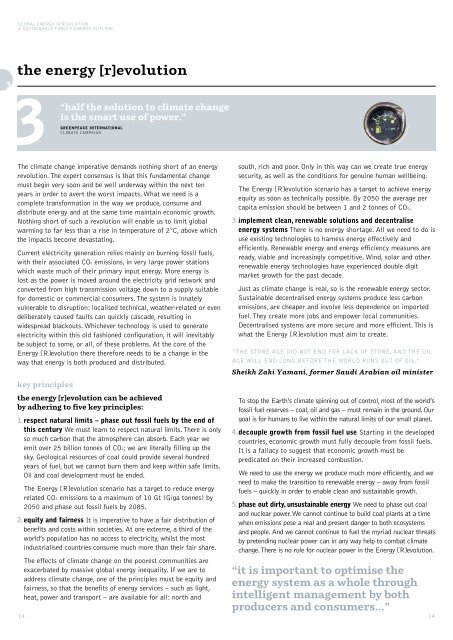
![Energy [R]evolution - European Commission](https://img.yumpu.com/49109324/1/184x260/energy-revolution-european-commission.jpg?quality=85)
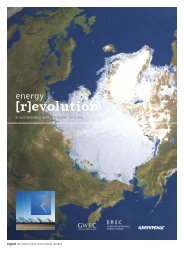
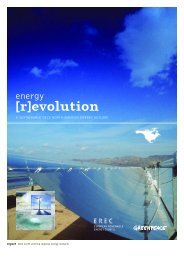
![5905 gp [eu rev]csfr4.qxd - Energy [R]evolution](https://img.yumpu.com/42305023/1/184x260/5905-gp-eu-revcsfr4qxd-energy-revolution.jpg?quality=85)
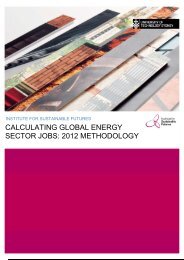
![5905 gp [eu rev]csfr4.qxd - Energy [R]evolution](https://img.yumpu.com/28729264/1/184x260/5905-gp-eu-revcsfr4qxd-energy-revolution.jpg?quality=85)
